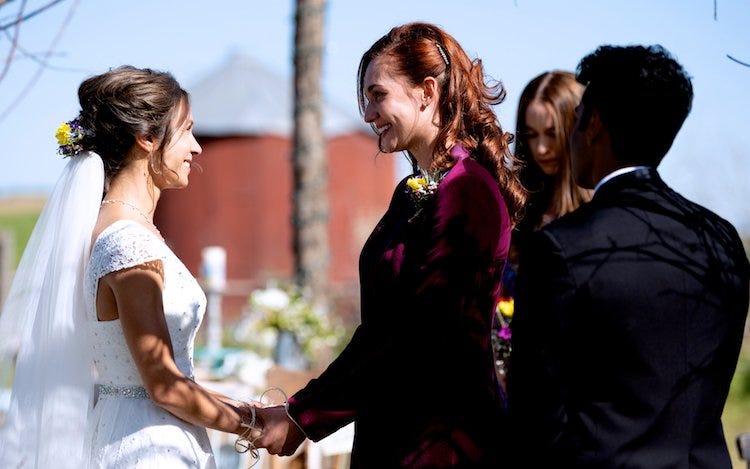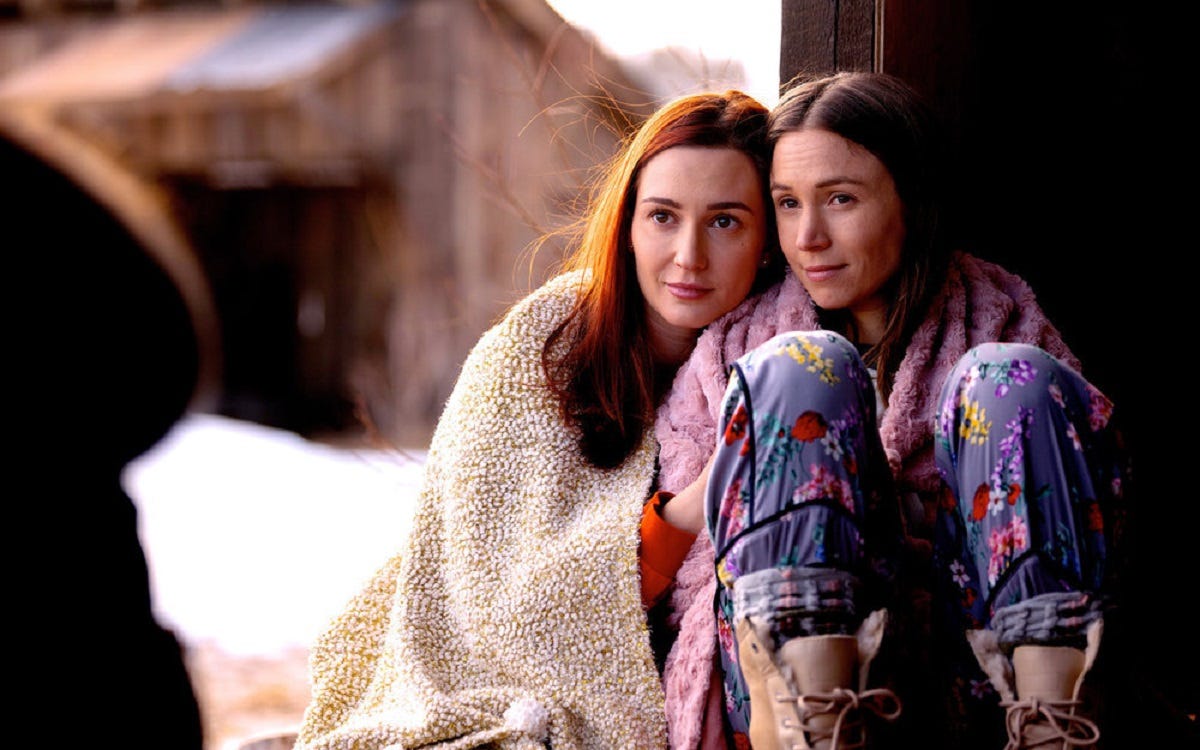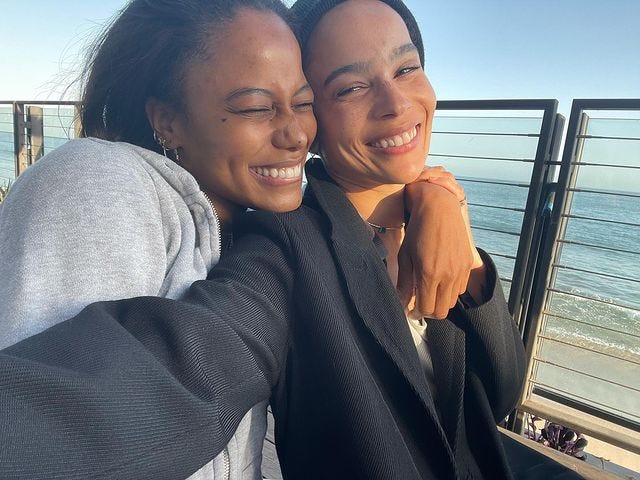The Queer Legacy of Wynonna Earp
On Gays That Just Won’t Die
This is the Sunday edition of Paging Dr. Lesbian. Plus, this week’s dispatch from the lesbian internet. If you like this type of thing, subscribe!
Earlier this month, the SyFy series Wynonna Earp concluded its much-awaited fourth (and final) season. Indeed, had it not been for a passionate online fan campaign, Season 4 may have never been made at all. As a reward for its dedicated viewers, (as well as for the hard-lived characters themselves), the series ended with a lesbian wedding, an apt conclusion for a show that has always put family, love, and its community of devoted fans at its center.
In the best of ways, Wynonna Earp is a product of its time. The series follows the titular Wynonna Earp, an alcohol-dependent fuck-up who returns to her demon-infested hometown of Purgatory to find that she has inherited the family curse and is now the only thing protecting the town from total demonic possession. It is a show that draws much of its influence from fantasy and sci-fi shows of the past – most obviously Buffy The Vampire Slayer – and takes up the mantle of storytelling where the shows that came before it may have fallen short. These shortcomings have become increasingly evident in the case of Buffy, as stories about creator and showrunner Joss Whedon’s abusive behavior continue to come to light. Indeed, some fans have noted that Whedon’s misogynistic and racist behavior on set also bleeds into the script, particularly as it relates to Buffy’s inability to have a healthy sexual relationship.
In the case of Wynonna Earp, these problems are circumvented by thoughtful writing and a harmonious (at least as far as we’re aware) work environment. Cast and crew have both praised creator and showrunner Emily Andras’ care for both the characters as well as the people working behind the scenes, an ideal that shouldn’t be as uncommon as it apparently is. One example of this integration occurred in Season 2, during the filming of which Melanie Scrofano (Wynonna Earp herself) was pregnant. Instead of ignoring her pregnancy (or, like Cordelia in Whedon’s Angel, killing off the character once she gives birth), Andras chose to write it into the story, seeing no reason why a magic-gun-toting action hero couldn’t also be pregnant. I don’t mean to inextricably tie Wynonna Earp to Buffy, but its connections – as well as its departures – from its spiritual predecessor, are telling.
Andras has also been clear with her intentions from the start in telling an organic, affirming queer storyline (or storylines, as it were). In early Season 1, when the character of Nicole Haught (Katherine Barrell) was introduced as a potential love interest for Waverly, Wynonna’s sister, fans were excited but skeptical. The context of this moment is important. 2016 – the year the first season of Wynonna Earp aired – was a particularly bad year for fictional sapphics. From 2015 to 2016, 42 lesbian or bisexual women characters were killed on television – a number that is highly disproportionate to the amount of sapphic characters on TV in total. This trend reached its apex with the death of a beloved character named Lexa on The CW series The 100, an event that spurred an online fan campaign demanding that #LGBTFansDeserveBetter and renewing conversation about the Bury Your Gays trope. (This trope is also present in Buffy, by the way, as fan-favorite Tara gets killed off in Season 6).
Andras – who previously worked on another very sapphic show, SyFy’s Lost Girl – was familiar with this trope and also had experience with queer fandom. This cultural understanding shone through in Season 1 when Nicole had a near-death experience. When Nicole got shot in the Season 1 finale, fans were immediately devastated, only to find out that Nicole was wearing a bulletproof vest and would live to see another day. (This led some fans to suggest that maybe all sapphic characters should wear bulletproof vests from then on). Though the episode was technically written before Lexa’s death on The 100 aired, Andras later explicitly vowed not to kill off any queer characters on the show, a unique promise from a showrunner.
Though Season 4 of Wynonna Earp was its last, even getting the season off the ground was a miracle in and of itself. Though the show has always had middling ratings, (season three averaged less than 500,000 viewers per episode), it has one of the most dedicated fan bases of any show on television right now. So, in 2018 when the series was renewed for a fourth season by SyFy, fans were overjoyed. However, due to a struggle to cover the costs of production, Season 4 was delayed indefinitely, with no clear plans to resume production. When this news was made public, fans immediately rallied together to try to save the show from television oblivion. Wynonna Earp fans (known as “Earpers”) created the hashtag #FightForWynonna and got it trending globally on Twitter, even going so far as to rent billboards in Times Square that displayed the hashtag.
This fan campaign paid off, as SyFy and IDW (the co-producer of the series) announced in late 2019 that Season 4 would once again begin production. The long-awaited Season 4 concluded earlier this month, with the finale episode centering around – as I noted above – a lesbian wedding. Even though Season 4 is said to be the show’s last, fans are continuing to rally for a fifth season at another network, and a producer on the show has said “we have more stories to tell.” (Andras herself has said she kept the ending intentionally open-ended).
Such fan campaigns are becoming more and more common these days, but the relatively small size of this fandom – especially considering the influence it was able to have on SyFy – is unique. (Unlike the Twitter users arguing that DC should #ReleaseTheSnyderCut of The Justice League, Earpers did not have millions of fans rallying around them, nor a media giant like HBO take up their cause). To be sure, huge media companies like Netflix (or in this case SyFy, which is owned by NBCUniversal) still hold most of the power in deciding what media makes it to our screens. But the case of Wynonna Earp, or the similar situation that occurred with One Day at a Time, has proven that the impetus for media production can in some cases come from the viewers themselves. (The Netflix model of cancellation, however, remains disheartening, as ostensibly popular shows – particularly those populated and produced by people of color – frequently get canceled after the first couple of seasons without any concrete reasoning for such cancellation. This is another problem with the dissolution of the TV ratings system as a whole – media companies like Netflix are not accountable to their viewers in terms of data sharing).
Though at times “fan service “ (ie. cowing to the demands or desires of fans) can be detrimental to the act of storytelling itself – it has been convincingly argued that the Star Wars franchise has begun to suffer recently for precisely this reason – Wynonna Earp exemplifies a fan-creator relationship that is more symbiotic. While Andras’ statement that she would definitely not be “burying the gays” might seem like something said simply to placate anxious fans, it also illustrates an understanding of the broader televisual milieu and the creative team’s efforts to set themselves apart precisely by recognizing what will be exciting and uplifting for viewers.
Evidently, the queer aspects of the series have not only had an effect on the show’s dedicated fans, but its cast of actors as well. During Wynonna Earp’s run, both of the actors who portrayed the popular couple “WayHaught” came out as queer. Katherine Barrell (Nicole Haught) came out in an interview with Diva in 2019, while Dominique Provost-Chalkley (Waverly Earp) came out on her 30th birthday last year in an Instagram post. Both actors cited the show itself as important stepping stones in their coming-out journeys, with Provost-Chalkley saying she might not have come out had she not been on Wynonna Earp. (Incidentally, Provost-Chalkley and Barrell are not the first actors to come out after playing a sapphic character. Chyler Leigh, who plays lesbian hero Alex Danvers on Supergirl, came out last year, and Ali Liebert, who played a lesbian factory worker in the Canadian series Bomb Girls, also came out after being on the show. Sidenote: go watch Bomb Girls).
All of this is to say that the show's content and the fan involvement surrounding it have clearly impacted all those who have come into contact with it. It has even spawned several Wynonna Earp-specific fan conventions – such as Earp-A-Palooza and Earp Expo – as well as having a sizeable presence at other conventions like Comic-Con and ClexaCon. In a post-Buffy, post-Bury Your Gays Trope world, it has been enlightening to see a show that has been able to tackle the legacy of queer media as it relates to the convergence of these two ideas. All you need, it seems, is a demon-infested town run by a lesbian sheriff.
Welcome to this week’s dispatch from the lesbian internet.
First, I have some more upsetting news to report about the anti-trans bills being heard across the country. In Texas, where I currently reside, a bill known as SB1646, which would, as attorney Chase Strangio writes, “would remove trans kids from their homes if a parent affirms their gender,” is currently making its way through the legislature. Three other anti-trans bills have been considered this week in Texas. If you are in Texas, you can contact your representatives and urge them to oppose these bills. You can also provide written or verbal testimonies against these bills, and here is another action item. Another anti-trans sports bill has passed in North Dakota; here is where you can urge the Governor to veto the bill. Let’s keep up the pressure.
In more uplifting news, the CDC reported a single-day record for vaccinations last Saturday, (with 4.6 million vaccinations), a milestone that as one Twitter account pointed out, occurred mere days after Britney Spear’s announcement that she got the vaccine and that she felt “fine.” There is obviously a correlation here, and we all have Britney to thank. Work bitch!
In other news, Angel Olsen came out as gay on Instagram on Friday. This is not surprising considering her haircut (see below), but is still exciting news for her legions of sapphic fans. Let’s go lesbians.
On Saturday, Zoe Kravitz posted this image (pictured below) of her and actress Taylour Paige (of the upcoming film Zola as well as the recent Ma Rainey’s Black Bottom) with the caption “so…this is a thing.” Now, this isn’t necessarily a confirmation of something, but it really seems like a confirmation of something, right??? (Kravitz, by the way, recently divorced her husband). To add to it all, man-of-the-moment playwright Jeremy O. Harris (writer of Slave Play), commented “I ship this,” under the post. And, on the same day, Taylour posted this photo, captioned “I’ll take care of you if you want me to,” to which Zoe responded, “YES PLEASE AND THANK YOU.” I am going to need further updates on the situation, stat.
Lastly, I wanted to share this wonderful piece by writer Ayesha A. Siddiqi (find her newsletter here) about Promising Young Woman, which has gotten far more praise than I think it deserves and continues to be held up (very troubling so) as an example of “important” art about sexual assault. Read Ayesha’s insightful piece here.
That’s all for this week, folks! Stay tuned for more adventures during our next installment. I will leave you with this image of Dakota Johnson staring lovingly at Aubrey Plaza at the 2019 Film Independent Spirit Awards.












